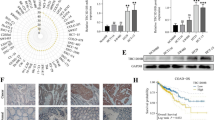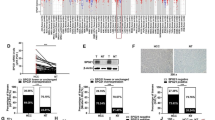Abstract
Objective
The aim of the study was to construct the eukaryotic expression vector of human angiopoietin-like protein 4 (ANGPTL4) and observe the effect of ANGPTL4 overexpression on the growth of esophageal carcinoma EC9706 cells.
Methods
Total RNA was extracted from normal hepatic tissue, and ANGPTL4 cDNA was amplified by RT-PCR. The PCR product was doubly digested by XbaI and SalI, and then recombined into eukaryotic expression vector. Then, pIRES-GFP-ANGPTL4 was obtained by G418 selection, then pIRES-GFP-ANGPTL4 and pIRES-GFP were transfected into EC9706 cells with lipidosome-packaged method. Meanwhile, the transfected cells were selected by G418, and then stable transfected cell lines were obtained. ANGPTL4 mRNA levels, the cell cycles and growth curves of EC9706 cells in experiment group (transfected with pIRES-GFP-ANGPTL4), empty vector group (transfected with pIRES-GFP) and blank control group (EC9706 cells without transfection) were detected with RT-PCR, flow cytometry and MTT methods, respectively.
Results
Eukaryotic ANGPTL4 expression vector pIRES-GFP-ANGPTL4 was successfully constructed. The ANGPTL4 mRNA level (0.21 ± 0.03) in experiment group was significantly higher than that of the empty vector group (0.04 ± 0.008) and the blank control group (0.05 ± 0.007), with significant differences (P < 0.01). The proportion of cells in S phase in experiment group was significantly different with those of the other two groups (P < 0.05). The cell growth of EC9706 cells in experiment group was slower than those of the other two groups. From the third day, the differences began to be significant.
Conclusion
ANGPTL4 overexpression in esophageal carcinoma EC9706 cells could inhibit the growth of EC9706 cells.
Similar content being viewed by others
References
Kim I, Kim HG, Kim H, et al. Hepatic expression, synthesis and secretion of a novel fibrinogen/angiopoietin-related protein that prevents endothelial-cell apoptosis. Biochem J, 2000, 346: 603–610.
Zhao J. Character and functional study in human breast carcinogenesis and development of ANGPTL4 gene. Master’s Thesis of Tianjin Medical University, 2005. 47.
Liu YB, Li KQ, Wang JW, et al. Gene transfer of human ANGPTL4 mediated by recombinant retroviral vector inhibits the growth of liver cancer. Chin J Gen Surg (Chinese), 2006, 21: 51–54.
Le Jan S, Amy C, Cazes A, et al. Angiopoietin-like 4 is a proangiogenic factor produced during ischemia and in conventional renal cell carcinoma. Am J Pathol, 2003, 162: 1521–1528.
Ito Y, Oike Y, Yasunaga K, et al. Inhibition of angiogenesis and vascular leakiness by angiopoietin-related protein 4. Cancer Res, 2003, 63: 6651–6657.
Zhu HX, Li JJ, Tan WX, et al. Cloning of a novel gene, ANGPTL4 and the functional study in angiogenesis. Natl Med J China (Chinese), 2002, 82: 94–99.
Author information
Authors and Affiliations
Corresponding author
Rights and permissions
About this article
Cite this article
Zheng, S., Wang, F., Ding, Y. et al. Effect of human angiopoietin-like protein 4 overexpression on the growth of esophageal carcinoma EC9706 cells. Chin. -Ger. J. Clin. Oncol. 9, 101–105 (2010). https://doi.org/10.1007/s10330-009-0174-8
Received:
Revised:
Accepted:
Published:
Issue Date:
DOI: https://doi.org/10.1007/s10330-009-0174-8




